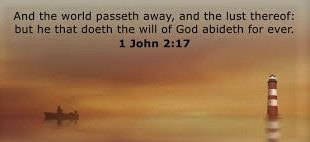One generation passeth away, and another generation cometh: but the earth abideth for ever. The sun also ariseth, and the sun goeth down, and hasteth to his place where he arose. The wind goeth toward the south, and turneth about unto the north; it whirleth about continually, and the wind returneth again according to his circuits. All the rivers run into the sea; yet the sea is not full; unto the place from whence the rivers come, thither they return again. All things are full of labour; man cannot utter it: the eye is not satisfied with seeing, nor the ear filled with hearing. The thing that hath been, it is that which shall be; and that which is done is that which shall be done: and there is no new thing under the sun. Is there any thing whereof it may be said, See, this is new? it hath been already of old time,
which was before us. Ecc 1:4-10
which was before us. Ecc 1:4-10
The Book of Ecclesiastes is one of the most unusual and perhaps most difficult to understand books of the Bible. It has a spirit of hopeless despair; it has no praise or peace; it seems to promote questionable conduct. But the words of the Preacher are his observations, that show the futility and foolishness of a life lived without an eternal perspective.
In verse one it tells us the identity of the Preacher. The son of David, king in Jerusalem. This identifies the Preacher as David’s son Solomon.
Ecclesiastes isn’t about the existence of God; the author is not an atheist, and God is always there. The issue is, whether or not God matters. The answer to that question is connected to a responsibility to God that goes beyond this earthly life. In his observations, he never directly addresses his contemplations in God's direction; he is as an unspoken, invisible entity.
In the search for this answer, the Preacher will search the depths of human experience, including despair. He examines the emptiness and futility of life lived without eternity before coming to the conclusion of the necessity of eternity.
“He does believe in ‘God,’ but, very significantly, he never uses the sacred name ‘Lord.’ He has shaken himself free, or wishes to represent a character who has shaken himself free from Revelation, and is fighting the problem of life, its meaning and worth, without any help from Law, or Prophet, or Psalm.” (Maclaren)
“We face the appalling inference that nothing has meaning, nothing matters under the sun. It is then that we can hear, as the good news which it is, that everything matters – ‘for God will bring every deed into judgment, with every secret thing, whether good or evil.’” (Kidner)
“What, then, is the purpose of Ecclesiastes? It is an essay in apologetics. It defends the life of faith in a generous God by pointing to the grimness of the alternative.” (Eaton)
Some insights to be pointed out in these verses are brought out in another excerpt from Eaton:
“He does not come as a formal philosopher; it is a word from God he has to share, despite his reflective low-key approach. He does not present half-a-dozen arguments for the existence of God. Instead he picks up our own questions. Can you cope with life without having any idea where you are going? You don’t have all the answers to life’s enigmas, do you? Your neo-pagan view of life doesn’t give you any hope of achieving very much, does it? Nature will not answer your questions, and you are bored by it anyway. History baffles your attempts to understand it. You don’t like to think about your own death; yet it is the most certain fact about your existence.” (Eaton)
In verse one it tells us the identity of the Preacher. The son of David, king in Jerusalem. This identifies the Preacher as David’s son Solomon.
Ecclesiastes isn’t about the existence of God; the author is not an atheist, and God is always there. The issue is, whether or not God matters. The answer to that question is connected to a responsibility to God that goes beyond this earthly life. In his observations, he never directly addresses his contemplations in God's direction; he is as an unspoken, invisible entity.
In the search for this answer, the Preacher will search the depths of human experience, including despair. He examines the emptiness and futility of life lived without eternity before coming to the conclusion of the necessity of eternity.
“He does believe in ‘God,’ but, very significantly, he never uses the sacred name ‘Lord.’ He has shaken himself free, or wishes to represent a character who has shaken himself free from Revelation, and is fighting the problem of life, its meaning and worth, without any help from Law, or Prophet, or Psalm.” (Maclaren)
“We face the appalling inference that nothing has meaning, nothing matters under the sun. It is then that we can hear, as the good news which it is, that everything matters – ‘for God will bring every deed into judgment, with every secret thing, whether good or evil.’” (Kidner)
“What, then, is the purpose of Ecclesiastes? It is an essay in apologetics. It defends the life of faith in a generous God by pointing to the grimness of the alternative.” (Eaton)
Some insights to be pointed out in these verses are brought out in another excerpt from Eaton:
“He does not come as a formal philosopher; it is a word from God he has to share, despite his reflective low-key approach. He does not present half-a-dozen arguments for the existence of God. Instead he picks up our own questions. Can you cope with life without having any idea where you are going? You don’t have all the answers to life’s enigmas, do you? Your neo-pagan view of life doesn’t give you any hope of achieving very much, does it? Nature will not answer your questions, and you are bored by it anyway. History baffles your attempts to understand it. You don’t like to think about your own death; yet it is the most certain fact about your existence.” (Eaton)
Excerpts from Biblical Illustrator:
Consider the representation the text gives us of the generations of men. For what is here spoken is not concerning one man, or one family of the human race, or one city, or a particular nation, or a certain age. It is true of all nations, of all generations, from the time of Adam and Noah to the present.
“One generation passeth away.”
(1) Look back to the past. Many generations that once existed in this world are gone. Men; famous for their various exploits, are now no more. In the past generations, some rose from mean and low stations to the highest rank; while others fell from posts of dignity to a state of poverty and depression. All of them—high and low, rich and poor, learned and ignorant, kings and their people—all are swept away. In former ages, immense armies of men; one army is said to have consisted of a million; but they have all passed away, and nothing is known of any one of them, except their commander. Nations once great and flourishing are now almost forgotten: even Babylon can scarce be found. “One generation passeth away.”
(2) This is true also of the present. The generation to which we belong is moving off the world. There is no continuance, no abiding here. Our old friends and acquaintances are gone, and we all feel that we live in a dying generation. Yes, great and useful men ate taken away; parents are taken from children. There is no standing still, even if you live. “One generation passeth away.”
(3) This is true of all future generations. They all will pass away, and all in the same manner.
Some inferences to promote practical improvement in our living:
1. Are all that have been before passed away? and are all that are now present, and all that will be in future, passing? What will be your state if you were to die now?
2. Then let us be concerned to do with diligence the work which God requires of us while in the present world. Now, the first thing which God requires of us is that we believe on the name of the Son of God: without this, nothing else will avail.
Consider the representation the text gives us of the generations of men. For what is here spoken is not concerning one man, or one family of the human race, or one city, or a particular nation, or a certain age. It is true of all nations, of all generations, from the time of Adam and Noah to the present.
“One generation passeth away.”
(1) Look back to the past. Many generations that once existed in this world are gone. Men; famous for their various exploits, are now no more. In the past generations, some rose from mean and low stations to the highest rank; while others fell from posts of dignity to a state of poverty and depression. All of them—high and low, rich and poor, learned and ignorant, kings and their people—all are swept away. In former ages, immense armies of men; one army is said to have consisted of a million; but they have all passed away, and nothing is known of any one of them, except their commander. Nations once great and flourishing are now almost forgotten: even Babylon can scarce be found. “One generation passeth away.”
(2) This is true also of the present. The generation to which we belong is moving off the world. There is no continuance, no abiding here. Our old friends and acquaintances are gone, and we all feel that we live in a dying generation. Yes, great and useful men ate taken away; parents are taken from children. There is no standing still, even if you live. “One generation passeth away.”
(3) This is true of all future generations. They all will pass away, and all in the same manner.
Some inferences to promote practical improvement in our living:
1. Are all that have been before passed away? and are all that are now present, and all that will be in future, passing? What will be your state if you were to die now?
2. Then let us be concerned to do with diligence the work which God requires of us while in the present world. Now, the first thing which God requires of us is that we believe on the name of the Son of God: without this, nothing else will avail.
Life in the light of Christ-God's Reply
To all these dissatisfied searchers after novelty, we can hear God say, “If any man be in Christ he is a new creature; old things are passed away, behold all things are become new.” Yes, this is our great necessity, to become new creatures in Christ Jesus; then shall we find old things pass away, and all things become new. Do you want a new experience? You may have it in communion and fellowship with Christ. Do you, wearied with the familiar and unsatisfying objects of the world, want new sources of enjoyment and new objects of contemplation and pursuit? All these you will realize in a life in Christ. (T. M. Morris.)
THE TESTIMONY OF AN UNSATISFIED SOUL
| All is vanity! This cry finds an echo in human hearts of every age and clime. Clod meant man to be happy. “These things,” said our Lord, “I have spoken to you, that your joy may be full.” “The fruit of the Spirit is joy.” Yet the air is laden with complaint and bitterness. Men are asking constantly, “Is life worth living?” The present age is full of unrest and weariness, of war and strife, of unsatisfied yearnings and desires. The mistake is that men seek to solve the mystery of life and to find their happiness apart from God, who has made us for Himself. |
This book was written and incorporated in the Bible to show that man’s quest for happiness is vain, so long as it is apart from God. Solomon had unbounded opportunities for pursuing his quest. Youth, wealth, wisdom, royalty, human love were his, but when all were mixed in the golden cup of his life, he turned from the draught unsatisfied and sad. Listen to the sigh of the sated voluptuary: Vanity of vanities! Let us turn from these bitter experiences to 1Jn_2:15-17. (F.B. Meyer)
Do Not Love the World
1Jn 2:15 Love not the world, neither the things that are in the world. If any man love the world, the love of the Father is not in him.
1Jn 2:16 For all that is in the world, the lust of the flesh, and the lust of the eyes, and the pride of life, is not of the Father, but is of the world.
1Jn 2:17 And the world passeth away, and the lust thereof: but he that doeth the will of God abideth for ever.
1Jn 2:16 For all that is in the world, the lust of the flesh, and the lust of the eyes, and the pride of life, is not of the Father, but is of the world.
1Jn 2:17 And the world passeth away, and the lust thereof: but he that doeth the will of God abideth for ever.
In Summary
Distinguish between the world of nature and the world of appearance, which is an illusion, the vain dream of human imaginings and boastings. It is the sphere of sense as contrasted with the sphere of spirit. It is the sum of all that the flesh lusts after, the eyes feast on, and the soul takes pride in. The Preacher gathers the world into one phrase, “under the sun,” Ecc_1:3. The world is passing as a moving-picture film, and the power to enjoy it is vanishing also. Only that which is rooted in God abides. (F.B. Meyer)










